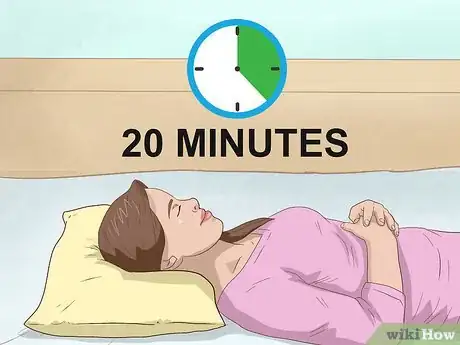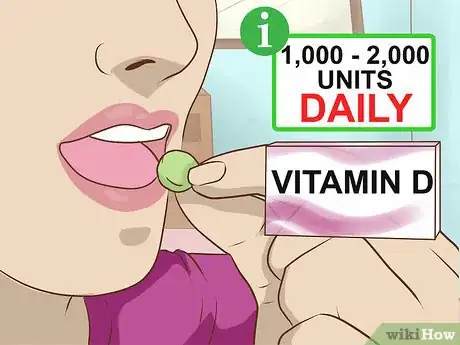This article was co-authored by Michael Lewis, MD, MPH, MBA, FACPM, FACN. Michael D. Lewis, MD, MPH, MBA, FACPM, FACN, is an expert on nutritional interventions for brain health, particularly the prevention and rehabilitation of brain injury. In 2012 upon retiring as a Colonel after 31 years in the U.S. Army, he founded the nonprofit Brain Health Education and Research Institute. He is in private practice in Potomac, Maryland, and is the author of "When Brains Collide: What every athlete and parent should know about the prevention and treatment of concussions and head injuries." He is a graduate of the U.S. Military Academy at West Point and Tulane University School of Medicine. He completed post-graduate training at Walter Reed Army Medical Center, Johns Hopkins University, and Walter Reed Army Institute of Research. Dr. Lewis is board certified and a Fellow of the American College of Preventive Medicine and American College of Nutrition.
There are 9 references cited in this article, which can be found at the bottom of the page.
This article has been viewed 115,066 times.
The belief that humans only use 10 percent of their brain is a myth. The brain is a living, hard-working organ that governs most of the body’s functions.[1] However, you can expand your capabilities and use more of your brain by maintaining your healthy and challenging yourself to try new things.
Steps
Stimulating Your Brain
-
1Get out in nature. Hiking in natural environment for 90 minutes has been shown to improve cognitive function, reduce potentially harmful ways of thinking and boost creativity. Walking in an urban environment can give you some beneficial exercise, but it seems that exposure to nature has a therapeutic effect.[2]
-
2Engage in brain training that is especially rigorous. Scientists seem to think that most brain games are too fun to affect cognition and increase intelligence; however, some particularly hard games can improve your fluid intelligence. Try the dual n-back task and remember that the more challenging it is, the more it is likely to improve cognition.[3]
- Another way to do this is to read a very hard book. Try to find a book that contains about 20 percent new vocabulary. As soon as that becomes easy, find an even harder author to read.
Advertisement -
3Stop relying on machines for basic brain functions, so that you can exercise your brain. Avoid using calculators, GPS navigators and spell check for basic editing. Mental math and navigation are great ways to form new pathways and use problem-solving skills.
-
4Learn until you master a task and then start a new one. As soon as you start to get good at something, your brain becomes more efficient and stops trying new possibilities to solve a problem. Once you get good at Sudoku, start to do crosswords.
- Consider learning a language or a musical instrument. The longer the task takes to master, the more you’ll need to memorize and discover in the process.
-
5Join a book club or another social class. Social interaction helps you find new perspectives, while classes can improve your critical thinking abilities. Interacting with people will give your brain more of a workout than an online course.[4]
-
6Try new things. Routines tend to reduce your brain function—hence the common use of the term “auto-pilot” during tasks like cooking, watching TV or driving. Try for a new job, travel and do new activities whenever you can and you’ll constantly make new connections.
-
7Take naps. A 20-minute nap can boost cognition. Even a nap as short as six minutes has been linked to improved brain function.[5]
Optimizing Your Health
-
1Get at least 20 minutes of aerobic activity every day. Getting your blood flowing actually gets your brain flowing. After 20 minutes (or more) of exercise you will boost your memory, information processing and neuroplasticity.
- Neuroplasticity is your brain’s ability to create new connections between cells.[6]
-
2Maintain a healthy, balanced diet. Approximately 20 percent of the nutrients you consumer feed your brainpower, so a balanced diet filled with protein, fats and a wide variety of fruits and vegetables is necessary for a healthy, useful brain.[7]
- Studies have shown that the only diet plan that's ever been shown to be good for your brain as far as preserving cognition is the Mediterranean style diet.
-
3Aim to get a full night’s sleep every night. Seven to nine hours of sleep is necessary to keep your mind functioning at its best. Your body requires the sleep to process hormones and your brain makes important new connections at night.
-
4Learn to relax. Although stress can give you extra strength and adrenaline, it limits your creative brain capacity when it’s a part of your everyday life. Embrace your favorite relaxation technique, such as meditation, yoga, music or napping.
-
5Ensure you are getting 1,000 to 2,000 units of vitamin D daily. Scientists have found a link between low levels of this vitamin and slow cognitive processing and function. If you don’t get 15 to 30 minutes of sunlight several times per week, talk to your doctor about a supplement.[8]
-
6Eat plenty of Omega-3 fatty acids. These acids help the brain to process information efficiently. The best Omega-3 foods are mackerel, salmon, walnuts, chia seeds, herring, salmon, flaxseeds and tuna.[9]
-
7Avoid tobacco use and limit alcohol use. It’s no surprise that these substances act like poison to the brain. Long-term use and overuse can lower your brain function.
-
8Take care of yourself throughout your life. The earlier you change your habits, the better your brain health will be. Try to make these changes as soon as possible.
Things You'll Need
- Vitamin D exposure/supplements
- Omega-3 foods
- Exercise regimen
- Dual n-back task brain training
- Difficult books
References
- ↑ https://www.theatlantic.com/technology/archive/2014/07/you-already-use-way-way-more-than-10-percent-of-your-brain/374520/
- ↑ https://news.stanford.edu/2015/06/30/hiking-mental-health-063015/
- ↑ https://www.nature.com/articles/s41598-021-82663-w
- ↑ https://www.nytimes.com/2017/06/12/well/live/having-friends-is-good-for-you.html
- ↑ https://pubmed.ncbi.nlm.nih.gov/21075238/
- ↑ https://www.sciencedirect.com/science/article/abs/pii/S0149763413001012
- ↑ https://www.canr.msu.edu/news/brain_nutrition_is_food_for_thought
- ↑ http://www.scientificamerican.com/article/does-d-make-a-difference/
- ↑ https://www.mdpi.com/2072-6643/12/5/1382/htm
About This Article
To heighten your brainpower, make physical and mental exercise a top priority. Physical activity, such as hiking for 90 minutes, can improve your overall cognition while doing 20 minutes of aerobic exercise a day is linked to improved memory. To exercise your mind, try new things like learning a new language or how to play an instrument. To get the most out of your brain, make sure that you eat foods rich in Vitamin D and get adequate sleep at night while avoiding harmful substances, like alcohol and tobacco. If you want to learn how to train your brain by doing stimulating tasks, keep reading!












































































Medical Disclaimer
The content of this article is not intended to be a substitute for professional medical advice, examination, diagnosis, or treatment. You should always contact your doctor or other qualified healthcare professional before starting, changing, or stopping any kind of health treatment.
Read More...